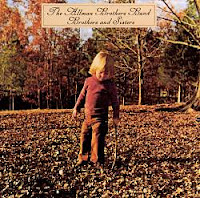The Jimmy Herring
Band – Variety Playhouse – September 22, 2012 – Some thoughts and reflections
Humbling. To see and
hear music played at maybe the highest levels of mortal human capability. Technically, it was jaw-droppingly stunning.
I think I've only encountered two players anywhere close to this level of proficiency
& dexterity - Mahavishnu John McLaughlin, and Allan Holdsworth. Professionally the performance was of the
highest quality – from the sound (after some gremlins were exorcised), to the
lights, to the set-list and precision of the musicians. However, the real magic that took place was
in the interaction between the band members themselves. There was an almost telepathic connection
between all of them, seemingly being conducted through Jeff Sipe (AKA Apt.
Q258) the drummer. He was ‘ground zero’ for just about everything that happened
on stage – I’d NEVER seen or heard anything like it before (maybe I wasn’t
paying attention before?). Each player
is a monster musician in their own right, but when they play together they
ascend to a higher level. They exemplify
the Gestalt Theory of the’ whole being greater than the sum of its parts’. The various dynamics taking place on that
stage and in the theater resulted in a dizzying array and assault of the senses. Jimmy has a tone he has perfected on his
various Stratocasters and amp rig that cuts right into your soul. His signature approach is a multi-modal scale
run assault punctuated by impossibly melodic and beautiful chord overlays. His
tenure with Widespread Panic hasn’t stretched his ability, as much as it
perfected his approach to the ‘jam’.
Jimmy has that rare and unique talent of playing just what the music
calls for, not just gratuitous ‘shredding’ and show boating.
The true highlight for me was to watch the
interplay between Jimmy and Matt Slocum on Keyboards. Throughout the evening I couldn’t help be
reminded of the Mahavishnu Orchestra and how John McLaughlin and Jan Hammer
used to spar with each other. To round
out this comparison they brought out Nickey Sanders on violin for a few tunes and
strains of Jerry Goodman made the association complete. You can tell Jimmy has been deeply influenced
by McLaughlin, Holdsworth, Pat Martino, and Jeff Beck (to name a few).
Part of the 2nd set saw a decidedly ‘Beetlie’
influence with the George Harrison, Within You, Without You, and A Day in the
Life. The former tune started with an
ethereal intro that took the entire theater to some mystic mountain in India,
and then launched into a traditional Indian raga that transported us to another
place & time, until Jimmy released the ‘Gods of Thunder’ and peeled our
scalps back. The latter tune, Day in the
Life, was interesting in how Jimmy effectively used his guitar for what would
have been the singer. The song was spot
on to the original, musically, until the part where it all comes apart,
crashing and burning which then launched the band into a wild ‘free for all’
jam that blew the roof off. The Col. Bruce Hampton made an appearance for a rousing rendition of, Fixin' to Die Rag and His Weirdness delighted the crowd as he led the band through a hilarious 'play behind your head' routine that erupted into a wonder jam. True to form, once the Col. was done, he put down his guitar and left the stage, even though the band was still playing - and he was gone as quickly as he appeared.
They closed with what seemed almost anti climatic – it was a
slow, low key interpretation of Ray Charles, Georgia on My Mind. In a way, that was probably wise as it gave
everyone a chance to start coming down out of the clouds. I’m still in ‘shock and awe’ even as I write
this Sunday morning.
Its experiences like this that are not just life sustaining –
they are life affirming!






















